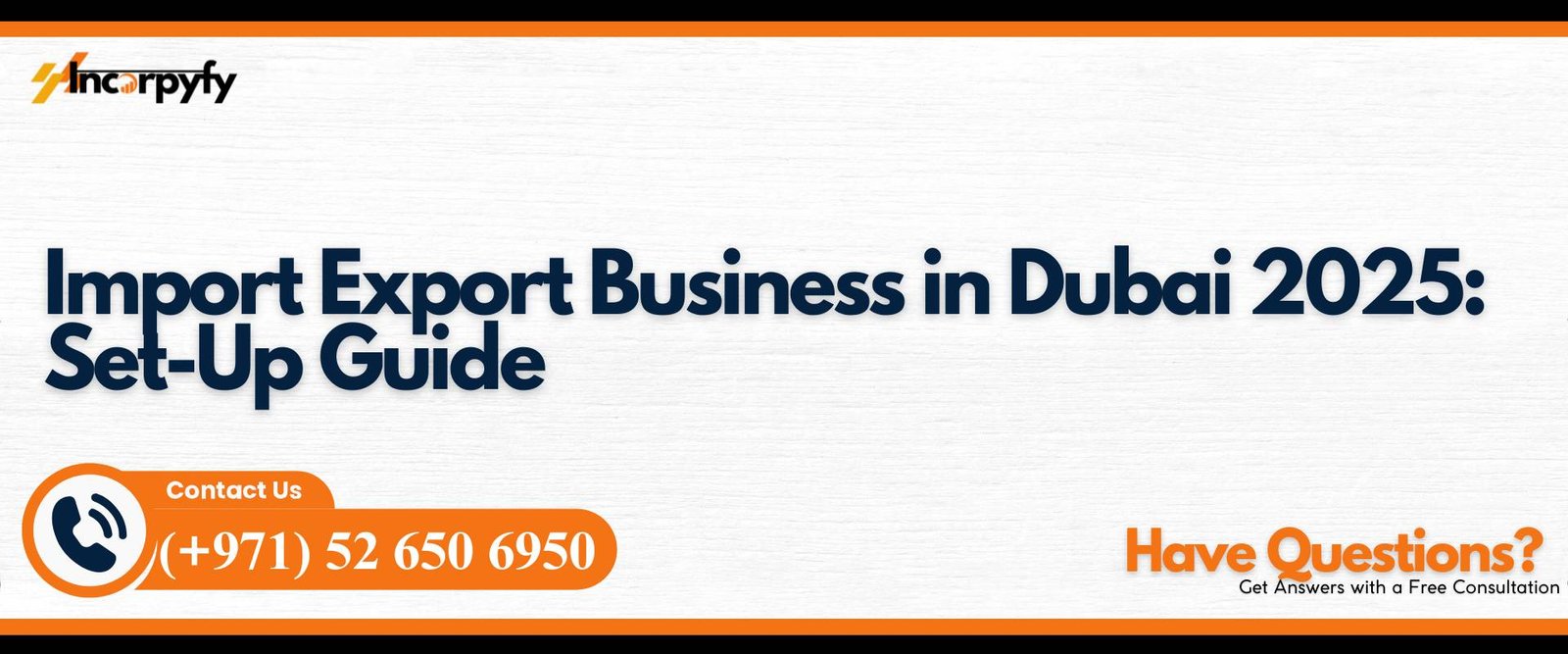
Dubai has emerged as the undisputed trade hub of the Middle East, making it an ideal destination for entrepreneurs looking to establish an import export business. With its strategic location connecting Asia, Europe, and Africa, world-class infrastructure, and business-friendly policies, Dubai offers unparalleled opportunities for international trade. This comprehensive guide will walk you through everything you need to know about setting up your import export company in Dubai in 2025.
Why Choose Dubai for Your Import Export Business?
Dubai’s position as a global trading hub isn’t accidental. The emirate has invested heavily in creating an ecosystem that supports international commerce. The city’s free trade zones, advanced logistics infrastructure, and strategic location make it a natural choice for businesses engaged in cross-border trade.
The UAE’s import export market has shown remarkable resilience and growth, with the country’s non-oil foreign trade reaching new heights year after year. Dubai alone handles over 70% of the UAE’s re-export trade, making it a crucial gateway for businesses looking to tap into regional and global markets.
What sets Dubai apart is its commitment to ease of doing business. The government has streamlined processes, reduced bureaucratic hurdles, and created an environment where import export businesses can thrive. The city’s multicultural workforce, excellent connectivity, and robust banking system further enhance its appeal for international traders.
Legal Requirements for Import Export Business Setup
Starting an import export business in Dubai requires compliance with specific legal requirements that vary depending on your chosen jurisdiction. The most popular options include setting up in the Dubai mainland or one of the many free zones.
For mainland setup, you’ll need to obtain a trade license from the Department of Economic Development (DED). This license allows you to conduct business anywhere in the UAE and gives you access to the local market. The process involves submitting required documents, paying the necessary fees, and meeting the minimum capital requirements.
Free zone setup offers different advantages, including 100% foreign ownership, tax exemptions, and simplified procedures. Popular choices for import export companies include Jebel Ali Free Zone (JAFZA), Dubai Multi Commodities Centre (DMCC), and Dubai Airport Free Zone (DAFZA). Each free zone has its own regulations and benefits tailored to specific industries.
The legal structure you choose will impact your business operations, taxation, and growth potential. Most import export businesses opt for Limited Liability Company (LLC) structure in the mainland or Free Zone Establishment (FZE) in free zones, depending on their specific requirements and long-term goals.
Step-by-Step Business Setup Process
Setting up your import export business in Dubai involves a systematic approach with clearly defined stages. Understanding each step helps streamline the process and avoid common pitfalls. From initial planning to final approvals, proper execution ensures your trading company becomes operational quickly and efficiently while meeting all regulatory requirements.
Documentation and Paperwork
The foundation of your import export business setup lies in proper documentation. You’ll need to prepare a comprehensive set of documents including passport copies of all shareholders, NOC from sponsors (if applicable), business plan outlining your import export activities, and proof of address.
For company registration, you’ll need to reserve a unique trade name that reflects your business activities. The name should comply with UAE naming conventions and shouldn’t conflict with existing businesses. You’ll also need to prepare the Memorandum of Association (MOA), which outlines your company’s objectives, shareholding structure, and operational framework.
Bank requirements include maintaining a minimum capital deposit, which varies based on your chosen jurisdiction and business activities. Most import export companies need to demonstrate sufficient capital to support their trading operations and meet regulatory requirements.
License Types and Permits
Choosing the right trade license is crucial for your import export business. A Commercial Trading License is the most common choice, allowing you to buy, sell, and distribute goods across various categories. Some businesses may require a Professional License if they’re providing consultancy services alongside trading activities.
Specialized permits may be required depending on your product categories. For example, food import requires approval from Dubai Municipality, while pharmaceutical imports need permits from the Ministry of Health. Electronics and technology imports may require additional certifications from the Telecommunications Regulatory Authority.
The customs clearance process requires obtaining an Importer/Exporter Code and registering with Dubai Customs. This registration enables you to legally import and export goods through UAE ports and borders, making it essential for your trading business operations.
Free Zones vs Mainland Setup
Choosing between free zone and mainland setup is a critical decision that impacts your import export business operations, costs, and growth potential. Each option offers distinct advantages tailored to different business models and objectives. Understanding these differences helps entrepreneurs make informed decisions aligned with their long-term business goals.
Advantages of Free Zone Setup
Free zones offer compelling advantages for import export businesses, starting with 100% foreign ownership. This means international entrepreneurs can fully own their companies without requiring a local partner, providing complete control over business decisions and profits.
Tax benefits in free zones include zero corporate tax for up to 15 years, no personal income tax, and exemption from import/export duties on goods transiting through the free zone. These tax advantages can significantly impact your business profitability and cash flow.
Free zones also offer streamlined setup processes, with many providing one-stop services for licensing, visas, and other requirements. The simplified procedures can reduce setup time from months to weeks, allowing you to start your trading operations faster.
Benefits of Mainland Setup
Mainland setup provides access to the local UAE market, which is crucial if you plan to sell products domestically. Unlike free zone companies, mainland businesses can bid for government contracts and establish direct relationships with local suppliers and customers.
The flexibility to operate anywhere in the UAE is a significant advantage of mainland setup. You can establish branches, open multiple offices, and conduct business across all emirates without restrictions, providing greater operational flexibility for growing import export companies.
Banking relationships are often easier to establish with mainland companies, as local banks are more familiar with mainland business structures. This can be particularly important for import export businesses that require extensive financing and credit facilities for their trading operations.
Required Capital and Investment
The capital requirements for your import export business vary significantly based on your chosen setup location and business scope. Free zone setups typically require lower initial capital, with some zones accepting minimum investments as low as AED 15,000 for basic trading licenses.
Mainland companies generally require higher capital investments, with LLC structures needing minimum capital ranging from AED 300,000 to AED 2 million, depending on the business activities and licensing requirements. However, this capital provides access to the broader UAE market and greater operational flexibility.
Beyond the minimum capital requirements, you should budget for additional costs including office rent, staff recruitment, customs clearance systems, and working capital for your initial import export transactions. Many successful trading companies recommend maintaining at least six months of operational expenses as working capital.
The return on investment in Dubai’s import export sector can be substantial, with many businesses achieving profitability within the first year. The key is choosing the right products, markets, and operational structure that aligns with your capital availability and growth objectives.
Key Documents and Permits Required
Establishing your import export business requires a comprehensive set of documents and permits. The process begins with company registration documents including the trade license, memorandum of association, and articles of association that define your business structure and activities.
Customs registration is mandatory for all import export companies. You’ll need to register with Dubai Customs and obtain the necessary permits for your specific product categories. This includes securing an Economic Operator Registration and completing the Authorized Economic Operator (AEO) certification process if applicable.
Product-specific permits vary based on your import export categories. Food products require approval from Dubai Municipality and the UAE Food Control Authority. Medical devices and pharmaceuticals need permits from the Ministry of Health. Electronic goods may require telecommunications authority approvals.
Banking documentation includes opening corporate bank accounts, establishing letters of credit facilities, and securing trade finance agreements. Most import export businesses require multiple banking relationships to manage international transactions, currency exchanges, and trade financing needs effectively.
Tax Implications and Benefits
One of the most attractive aspects of setting up an import export business in Dubai is the favorable tax environment. The UAE has no federal corporate income tax for most business activities, making it highly attractive for international traders looking to optimize their tax efficiency.
Free zones offer additional tax benefits including exemption from customs duties on goods transiting through the zone, no currency restrictions, and full repatriation of capital and profits. These benefits can significantly reduce your operational costs and improve profit margins.
The introduction of UAE Corporate Tax in 2023 affects businesses with annual profits exceeding AED 375,000. However, many import export activities qualify for exemptions or reduced rates, particularly those conducted through free zones or involving qualifying international trade activities.
VAT registration is mandatory for businesses with annual turnover exceeding AED 375,000. However, import export businesses can benefit from various VAT exemptions and zero-rating provisions for international trade transactions, potentially improving cash flow and competitiveness.
Best Products to Import and Export
Dubai’s strategic location makes it ideal for trading various product categories. Electronics and technology products remain among the most popular imports, with strong demand from regional markets. The city’s advanced logistics infrastructure supports efficient distribution of high-value electronic goods.
Food and beverages represent another lucrative sector, with Dubai serving as a regional distribution hub for international food brands. The growing population and tourism industry create consistent demand for quality food products from around the world.
Textiles and apparel benefit from Dubai’s established trading relationships with manufacturing hubs in Asia and consumer markets across the Middle East and Africa. The city’s fashion industry and retail sector provide strong domestic demand alongside re-export opportunities.
Automotive parts and accessories represent a growing market, supported by the region’s expanding automotive sector and infrastructure development. Dubai’s strategic location makes it an ideal hub for serving the broader Middle East and African automotive markets.
Marketing and Business Development Strategies
Successful import export businesses in Dubai require robust marketing and business development strategies. Building strong relationships with international suppliers and regional distributors is crucial for long-term success in the trading business.
Digital marketing plays an increasingly important role in connecting with international partners and customers. Establishing a professional online presence, utilizing B2B platforms, and engaging in digital trade shows can significantly expand your business reach and opportunities.
Trade shows and exhibitions in Dubai provide excellent networking opportunities. Events like Dubai World Trade Centre exhibitions, Gulfood, and industry-specific trade shows offer platforms to meet potential partners, understand market trends, and showcase your products.
Government support programs are available to help import export businesses expand their operations. Organizations like Dubai Export Development and Dubai Chamber of Commerce offer resources, training, and networking opportunities to support business growth and international expansion.
Conclusion
Setting up an import export business in Dubai in 2025 presents exceptional opportunities for entrepreneurs willing to navigate the requirements and leverage the emirate’s strategic advantages. The combination of world-class infrastructure, business-friendly policies, and strategic location makes Dubai an ideal hub for international trade.
Success in the import export sector requires careful planning, proper documentation, and strategic decision-making regarding your business structure and operational approach. Whether you choose free zone or mainland setup, Dubai offers the resources and support needed to build a thriving trading business.
The key to success lies in understanding the regulatory requirements, choosing the right products and markets, and building strong relationships with international partners. With proper planning and execution, your import export business can tap into Dubai’s position as a global trading hub and achieve significant growth and profitability.
For comprehensive support in establishing your import export business, consider partnering with experienced Business Setup in Dubai, UAE service providers who can guide you through the process and help you avoid common pitfalls while maximizing your business potential.
Frequently Asked Questions (FAQs)
How much capital do I need to start an import export business in Dubai?
The minimum capital requirement varies by jurisdiction. Free zone setups can start from AED 15,000, while mainland companies typically require AED 300,000 to AED 2 million depending on business activities and licensing requirements.
Can I own 100% of my import export business in Dubai?
Yes, free zones allow 100% foreign ownership. Mainland companies traditionally required a local partner, but recent law changes allow 100% foreign ownership in most commercial activities, including import export businesses.
How long does it take to set up an import export business in Dubai?
Free zone setups typically take 5-10 working days, while mainland setups can take 15-20 working days. The timeline depends on document preparation, approval processes, and specific business requirements.
What are the main free zones for import export businesses?
Popular choices include Jebel Ali Free Zone (JAFZA), Dubai Multi Commodities Centre (DMCC), Dubai Airport Free Zone (DAFZA), and Dubai South Free Zone. Each offers specific advantages for different types of trading activities.
Do I need a physical office to start an import export business?
Yes, you need a registered office address. Free zones often offer flexible office solutions including shared spaces, virtual offices, and flexi-desks. Mainland companies require a physical office that meets DED requirements.
What products cannot be imported or exported from Dubai?
Prohibited items include narcotics, weapons, counterfeit goods, and items that violate UAE cultural or religious principles. Some products require special permits, such as pharmaceuticals, food items, and electronics.
Is VAT applicable to import export businesses?
VAT registration is mandatory for businesses with annual turnover exceeding AED 375,000. However, many international trade transactions qualify for zero-rating or exemptions, potentially benefiting import export businesses.
Can I get financing for my import export business in Dubai?
Yes, UAE banks offer various trade finance solutions including letters of credit, trade financing, and working capital loans. Having a good business plan and meeting bank requirements is essential for securing financing.






